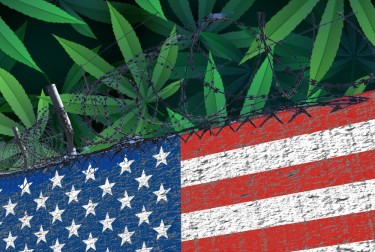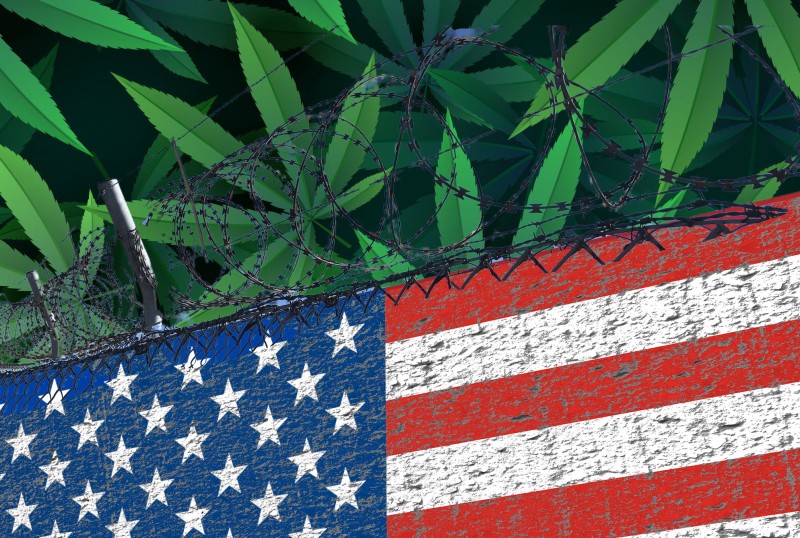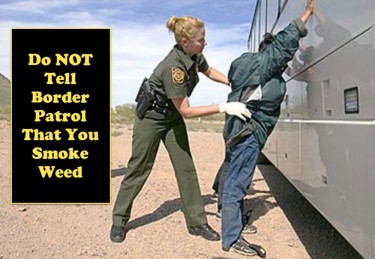
A Republican senator is pushing back against a recent policy change by U.S. Customs and Border Protection (CBP) that reduced the term of ineligibility for work due to past marijuana use from two years to three months. The senator doubts the trustworthiness of recruits who have used cannabis and believes that this move jeopardizes the safety and integrity of Border Patrol agents.
Senator James Lankford (R-OK) wrote to CBP Acting Commissioner Troy Miller, expressing severe concerns about the effects of this shift. He stated that the amendment blatantly contradicts the Border Patrol's principal mission of safeguarding the country from illicit drugs.
Ironically, no one in the Senator's office seemed worried about the US and Canadian border where cannabis has been recreationally legal for 7 years now. Many Canadians have been stopped and banned for cannabis use, yet the security issue does not seem relevant at the Northern border, just the Southern.
While the exact timing of the CBP's policy revision remains unclear, Senator Lankford disclosed that his office became aware of it during a briefing last month.
The senator alleges that CBP officers told his staff that ambiguity generated by disparities between state and federal marijuana regulations in places where cannabis has been legalized had a role in the policy shift. Senator Lankford did, however, emphasize that CBP, as a federal agency, is responsible for ensuring that federal rules governing the use of illegal substances are obeyed.
Additionally, the senator asserted that individuals who admit to past marijuana use often disclose involvement in other criminal activities, which he deemed unsurprising. He attributed this to the fact that irrespective of state laws, users frequently obtain marijuana from unlicensed vendors in the "gray market" due to its lower cost.
Furthermore, Senator Lankford alleged that licensed cannabis establishments frequently encounter corruption issues, citing reports of malpractices within his state's medical marijuana program. He claimed that undocumented immigrants are exploited for labor and subjected to adverse conditions in these facilities.
Addressing worries about the health repercussions of cannabis usage, the senator cited a putative relationship between marijuana intake and diseases including schizophrenia and psychosis. Despite contradicting study findings on the subject, Senator Lankford emphasized the need for federal government screening for psychiatric disorders and illegal drug use during background checks for federal jobs.
In conclusion, Senator Lankford cautioned that regular marijuana use, particularly in states where it is legalized, could significantly affect the trustworthiness of Border Patrol recruits, especially considering the incidence of psychosis among heavy cannabis users.
Concerns Over Border Patrol Recruits' Ties to Transnational Criminal Organizations Due to Altered Marijuana Use Review Period
Lankford expressed concern that shortening the period for reviewing marijuana use history raises the risk of Border Patrol recruits having financially supported transnational criminal organizations for marijuana cultivated by illegal immigrant labor. This scenario directly contradicts the Border Patrol's mission and could lead to significant security and integrity issues among agents.
In his capacity as the Ranking Member of the Subcommittee on Governmental Operations and Border Management, Lankford emphasized his Subcommittee's authority over Federal hiring and border management. He strongly objected to the policy change, fearing it would undermine the security and integrity of the Border Patrol workforce. Consequently, he urged CBP to revoke the policy and reinstate the two-year review period for marijuana use among Border Patrol recruits.
The senator presented eleven questions to CBP, seeking clarification by May 7 on various aspects, including the rationale behind the cannabis policy alteration, its impact on polygraph passage rates, and any other modifications to employment standards related to past marijuana use.
In essence, Lankford's stance is clear: despite acknowledging CBP's ongoing recruitment challenges and advocating for legalization to bolster border security and increase the agency's personnel, he believes that hiring individuals who may have used cannabis three months prior, as opposed to two years ago, poses an unacceptable risk.
Meanwhile, CBP advised its employees and their families against using even federally legal CBD products last year. The federal legalization of hemp and its derivatives has complicated CBP's enforcement efforts, prompting officials to seek portable marijuana analyzers to swiftly identify cannabinoid profiles and differentiate between marijuana and hemp.
Lankford's opposition to the policy change is unsurprising, given his longstanding reputation as a fervent prohibitionist. For instance, last September, he spearheaded a separate letter urging the head of the Drug Enforcement Administration (DEA) to reject a recommendation to reschedule cannabis.
Potential Impact on Border Security and Drug Interdiction Efforts
Senator Lankford is concerned about more than just the short-term effects of shorter qualifying periods for recruits to the Border Patrol. He predicts a chain reaction that may make border security and drug interdiction efforts less successful. Lankford contends that CBP runs the danger of admitting people who may have engaged in criminal activity in the past, especially those connected to transnational criminal organizations (TCOs), by loosening the scrutiny on prior marijuana usage. Because TCOs frequently take advantage of gaps in border control to move narcotics, weapons, and people across international borders, such links directly endanger national security.
Furthermore, Lankford questions the reliability of background checks and polygraph tests in identifying individuals with ties to criminal organizations, particularly given the evolving nature of drug-related crimes. The shortened review period may not provide sufficient time to uncover deeper associations or patterns of behavior indicative of criminal involvement. This, in turn, could lead to the infiltration of Border Patrol ranks by individuals sympathetic to or actively engaged in illicit activities, compromising the integrity of the agency and its mission to safeguard the nation's borders.
Lankford's worries about the wider social effects of permissive marijuana laws among law enforcement agencies go beyond the direct security ramifications. He argues that CBP's decision may undermine attempts to curb drug misuse and related criminal activity by sending a message of tolerance toward drug use. It also calls into doubt the coherence of federal drug enforcement initiatives, particularly given disparate state legalization policies for marijuana. Lankford highlights the necessity of a unified strategy for border security and drug control, one that respects federal authority while taking into account the intricacies of changing state laws.
Bottom Line
Senator James Lankford's staunch opposition to the recent policy change by U.S. Customs and Border Protection, which shortened the term of ineligibility for Border Patrol recruits due to past marijuana use, underscores concerns about potential risks to national security and the integrity of law enforcement agencies. His apprehensions regarding the infiltration of criminal elements into the Border Patrol workforce, coupled with doubts about the efficacy of screening procedures, highlight the broader implications of drug policy shifts within federal agencies. Lankford's stance emphasizes the importance of maintaining stringent standards in border security efforts while navigating the complex landscape of state and federal marijuana regulations.







